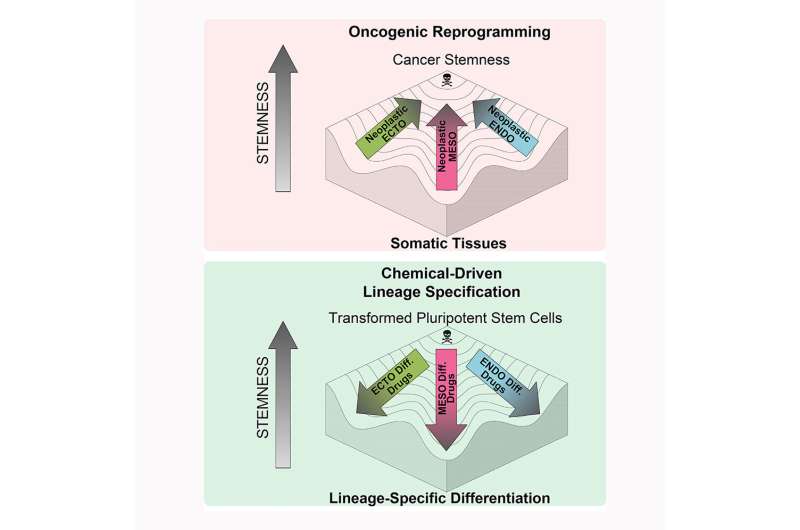This article has been reviewed according to Science X's editorial process and policies. Editors have highlighted the following attributes while ensuring the content's credibility:
fact-checked
peer-reviewed publication
trusted source
proofread
New stem cell research takes aim at origins of human cancers

How do cells become cancerous, multiply uncontrollably, and form into tumors? And what role do aberrant embryonic stem cells play? These are big questions explored by medical researchers since the embryonic theory of cancer was first proposed in the 19th century.
Now, in an exciting new study adding to the global pool of knowledge about the roots of human cancers, researchers are establishing a clear link between different types of cancers and their embryonic origins. They also identify new concepts that can be considered in future drug discovery projects and used in standard chemotherapeutics in the clinic.
Published in Cell Chemical Biology, the rigorous study is a collaborative effort by researchers at the uOttawa Faculty of Medicine, McMaster University, and the University of Calgary. Dr. Yannick Benoit is the paper's co-first author along with Dr. Luca Orlando, a postdoctoral researcher in the lab of Dr. Mick Bhatia at McMaster.
Dr. Benoit says that because cancer typically uses blueprints borrowed from embryonic stem cells to promote its propagation in the body, the team first sought to identify drugs that can force human embryonic stems cells to acquire adult tissue specification.
What they observed was highly compelling. They saw that drugs stimulating the formation of the embryonic nervous system were the most effective against brain tumors. Molecules promoting the acquisition of primitive gut features were best at blocking the formation of colon tumors. And drugs pushing embryonic cells toward becoming fetal blood cells were the most effective at killing leukemia.
"Ultimately, we observed that tumors in tissues with the same embryonic ancestry share similar molecular networks that can be targeted to eliminate cancer more effectively," says Dr. Benoit, a principal investigator and assistant professor in the Faculty's Cellular and Molecular Medicine (CMM) department.
It's taken more than a decade for the study to be completed and published. The research began in 2012, and Dr. Benoit worked on portions of the project at McMaster before being recruited to uOttawa in 2017.
This is deeply ambitious research. Essentially, the team was searching for drugs that trigger the specialization of embryonic stem cells toward specific paths of human development. Along the way, they uncovered molecules more effective at re-educating cancer cells based on a path once followed by the affected organ during its fetal life.
"While this concept has been previously proposed over the ages based on observing dissected tumor tissues and inferred through modern computational analyses, our study is the first to provide an experimental demonstration of its applicability in cancer drug discovery," says Dr. Benoit, who last year was recognized by the Gairdner Foundation for his exceptional research achievements and his future potential.
"Our discovery re-emphasizes that cancer is not a single disease, but hundreds of different ones regrouped under the same name. At the end of our journey, we will not find 'the cure' for cancer. Instead, it will be distinct therapeutic avenues with variable chances of success, depending on the type of cancer afflicting a specific patient," he says.
His lab at uOttawa—which aims to create novel anticancer agents that can target epigenetic features of colorectal cancer stem cells—developed the capacity to measure the effect of certain drugs on cancerous stems cells within colon tumor samples. The McMaster and University of Calgary groups were oriented on leukemia and brain tumors.
Together, the team was able to generalize their findings to 30 tumor types and their healthy tissue counterparts with the aid of data sets generated by researchers across the globe and available to the scientific community.
What are the next steps for Dr. Benoit's uOttawa lab as the research team explores questions suggested by this study?
"My lab keeps running searches for candidate drugs to destroy cancer stem cell populations in colon tumors," he says. "Most of our projects start with testing on human embryonic stem cells to see if our compounds of interest alter molecular signatures of early human development."
More information: Luca Orlando et al, Chemical genomics reveals targetable programs of human cancers rooted in pluripotency, Cell Chemical Biology (2023). DOI: 10.1016/j.chembiol.2023.06.004
Journal information: Cell Chemical Biology
Provided by University of Ottawa





















